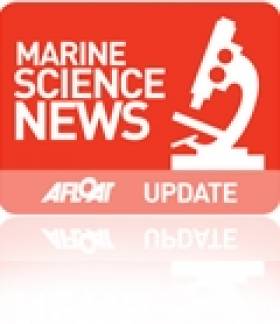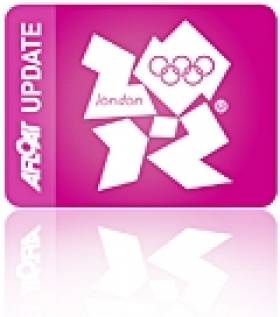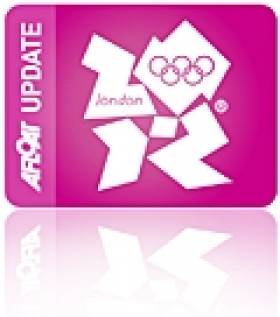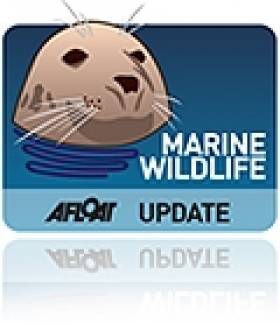Displaying items by tag: sonar
Sonar Survey Reveals Torpedoed Guinness Ship
The detailed seabed images, which include deck features and complex sand wave structures, were recorded by towed sidescan sonar provided by the Moore Marine Group, and give a visual insight into the defensively armed ship that was sunk by a German torpedo in 1917, seven miles east of the Kish Bank off Dublin.
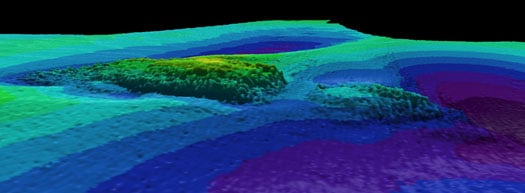
Photos above and below show topographic seafloor images in 3D, showing the partially buried wreck of the W M Barkley lying at a water depth of 56 metres; with deeper scouring around it down to 72 metres (darker colours indicate greater depths). The images were created from sonar data acquired onboard the Marine Institute's research vessel RV Celtic Voyager, during INFOMAR Programme mapping in 2010 and 2011 with data processed by INFOMAR's Fabio Sacchetti (University of Ulster) and Charise McKeon (Geological Survey of Ireland).
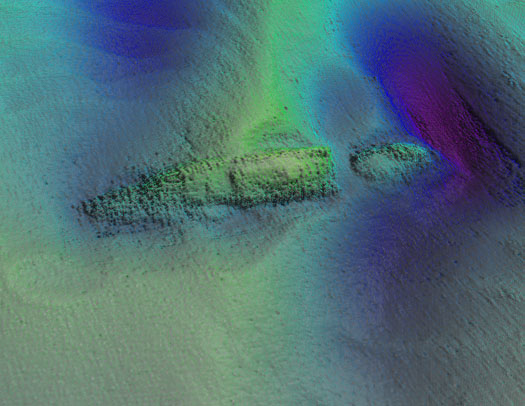
In May 2010, during a large scale mapping survey in the Irish Sea by INFOMAR, a national marine study run by the Marine Institute and the Geological Survey of Ireland, identified a seabed feature which, to the trained eye, was discernable as a potential shipwreck lying in the same position recorded on the Admiralty Chart, the EU wreck site and UK Hydrographic Office wreck site directories, as well as a survey conducted in the 1980s as the last known position of the W.M.Barkley.
Viewing the spectacular imagery of the shipwreck Minister for Communications, Energy & Natural Resources, Pat Rabbitte, said "I am delighted to note the continued excellence of the valuable work being carried out under the INFOMAR project. These images from the deep reveal a unique view of part of Ireland's marine heritage and I am delighted to announce details of INFOMAR''s annual seminar to be held in Galway on November 16 and 17th."
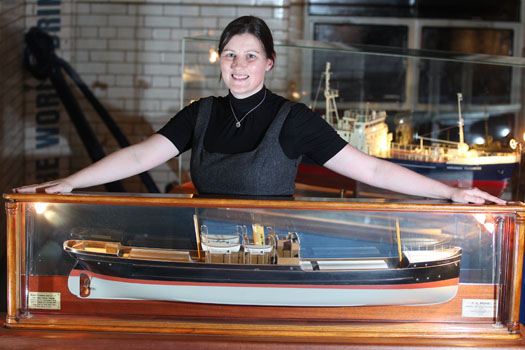
Eibhlin Roche - Guinness Archivist, Guinness Storehouse with the model of the W.M. Barkley. Photo: Jason Clarke Photography
Ninety four years ago on the dark night of October 12th 1917 the W.M.Barkley was torpedoed without warning by the German submarine UC-75. Within minutes the ship, which was owned and operated by the Guinness Company of Dublin, broke in two and sank, taking with her to the bottom four men including her Captain and leaving the rest of her crew to face the sea in an open lifeboat. Now, the darkness where the ship has lain in pieces has been disturbed, probed by fingers of sound that are mapping the seabed in incredible details and bringing to light the position of this famous Irish shipwreck.
"As the first Guinness owned ship, the W.M. Barkley played an important role in the story of the transportation of GUINNESS beer overseas," said Eibhlin Roche, Guinness Archivist. The events of the night of 12th October 1917 are very much part of the history of Guinness that is recorded in the Guinness Archive. It is exciting to finally know the exact resting place of the W.M. Barkley."
A scale model of the W.M. Barkley is on display in the Transport Gallery of Guinness Storehouse remembering the lives of the Guinness men who both perished and survived the events of 12th October 1917. These are stories of tragedy and bravery portraying Irish traditional values, and how they were brought to light with the application of cutting-edge technology.
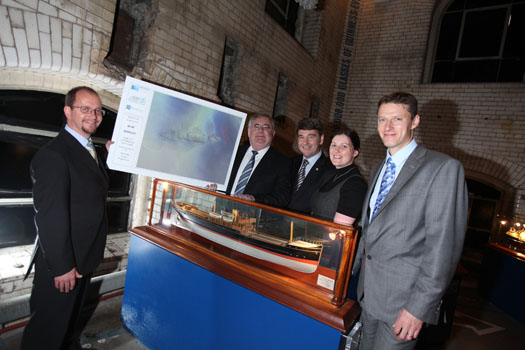
Koen Verbruggen (GSI), Minister Pat Rabbitte, Dr. Peter Heffernan (CEO, Marine Institute), Eibhlin Roche (Guinness Archivist, Guinness Storehouse) and David Smith (Country Director, Diageo Ireland) Photo: Jason Clarke Photography
Paralympic Sailing - Kinsale Trio are London Bound
Coming into racing today at the IFDS World Championships at Weymouth with one race to go, in the Sonar Class John Twomey and his crew Anthony Hegarty and Ian Costello from Kinsale Yacht Club were fairly confident they would take one of the six qualifying spots left for the 2012 Paralympic Regatta at Weymouth. Eight of the 14 places available had already been allocated.
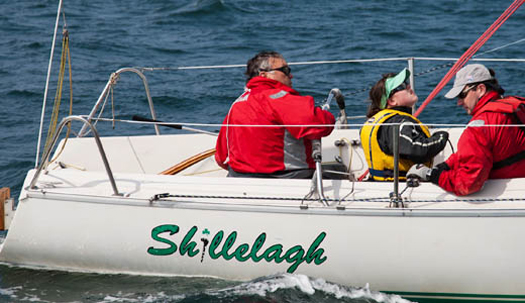
John Twomey has qualified in the Sonar class for next year's Paralympic Games in London. Photo: Bob Bateman
However, one can never be sure of anything until the last race has been sailed. Little did they know that such was to be the case today and with wind strength of 30 knots the last race for all classes was abandoned.
Jubilation then set in as the Irish crew realized they were indeed qualified, taking the second spot behind USA of the six remaining places. They were followed by Australia, Canada, Austria and Japan in that order making up the total of 14 sailors to compete in the Sonar Paralympic fleet in 2012.
Set-back for Twomey in Weymouth
There have been set backs for the Irish Paralympic crew today in the Sonar Class at Weymouth in the IFDS Worlds writes Claire Bateman.
Crews braved winds of more than 20 knots in Portland Harbour today as Weymouth and Portland's finally lived up to its reputation as a breezy venue after three days of light and fluky airs.
Things are really starting to hot up with two days and three races to go.

Gear failure has dropped Shillelagh to 12th. Photo: Bob Bateman
In spite of the fact that they suffered gear breakages in both races today that saw them slip to 12th place from 9th yesterday, when speaking with John Twomey after racing, he and his crew remained confident of qualifying the Irish spot for the 2012 Paralympics. Eight countries have qualified already and with six places remaining to be filled and, making the calculations, he said, except for disaster, they were very hopeful of making the qualification. He said that in to-day's racing they had to contend with winds of 25 knots making for extremely difficult conditions.
With the breezes well over 20 knots the 155 sailors competing at the RYA-run event at Weymouth and Portland National Sailing Academy this week were provided today with a completely different challenge to the first three days of racing and with the strong winds now forecast to remain for the rest of the week, the competitors are facing some close to the knuckle sailing. Competition in the Sonar Class is extremely keen and includes top world level sailors. Defending World champion Thierry Schmitter (NED) continued his march to his third consecutive crown with a first and second today, increasing his lead to 17 points over Britain's Helena Lucas. A good day for Schmitter's Dutch team mate Andre Rademaker saw him move into the medal places, as a race eight disqualification for Britain's Megan Pascoe saw her drop to fourth.
Racing continues tomorrow(Thurs) with Races 9 and 10 and will finish with Race 11 on Friday.
After 6 races and one discard John Twomey and his crew Anthony Hegarty and Ian Costello, all from Kinsale Yacht Club, are lying in 9th place overall in the 23 boat Sonar Class. John and his crew have just finished competing in Shilleagh at the Sovereign's Cup Kinsale, finishing 5th in Class 3 IRC and the ICRA Championships at Royal Cork Yacht Club where they finished 4th overall in Class 3 IRC finishing behind Tiger, Anchor Challenge and Blackfun in that order, an excellent performance indeed.
The IFDS World Championships, organised in 2011 by the RYA, is the most prestigious event in the disabled sailing calendar outside of the Paralympic Games and is being held at the Weymouth and Portland National Sailing Academy (WPNSA) that will play host to the sailing competition for the London 2012 Olympic and Paralympic Games.
The event is taking place from July 1st to 8th, 2011, and forms the second qualifying event for the 2012 Paralympic Games sailing competition, with entries exceeding 100 boats across 3 Paralympic Classes. The KYC team is hoping to make the Irish qualification for the Sonar class having just missed the qualification by one point last time around.
All the competitors in the huge entry are keen to gain experience of the Olympic and Paralympic venue in the run-up to 2012, making this event an important fixture in the international calendar.
Racing continues through to Friday 8 July.

A recent shot of John Twomey and crew in Action in Shillelagh. Photo: Robert Bateman
Removal of Whales to Cost Council €10,000
The pod, which had been observed in waters between Arranmore Island and Burtonport during the week before they stranded themselves on a beach on Rutland, were also believed to be the same pod monitored off the South Uist, off the Hebrides. Shortly before that it was feared that the whales may have also attempted to beach themselves.
Dr Simon Berrow of the Irish Whale and Dolphin Group (IWDG) said he could not rule out sonar interference for confusing the whales and leading to their beach deaths. For information on the IWDG logon to www.iwdg.ie
Sonar Possible Culprit in Whale Death Tragedy
Sonar activity by Royal Navy submarines may have caused the deaths of up to 35 pilot whales off the coast of Co Donegal at the weekend, an expert has claimed.
Dr Simon Berrow of the Irish Whale and Dolphin Group (IWDG) said that naval activity in the area is one possible cause of the tragedy.
"Naval exercises use a low frequency active sonar which is known to affect whales very badly," he told the Belfast Telegraph. "Basically it affects their sonar and causes a gas embolism, like the ‘bends’."
The Telegraph reports that tests are still being carried out to determine if the whales that beached on Rutland Island, near the fishing village of Burtonport, are the same as a group monitored in Scotland's outer Hebrides the previous weekend.
The pilot whales had reportedly been swimming off Co Donegal for the past week before they were found dead.
The Belfast Telegraph has more on the story (with photos) HERE.



























